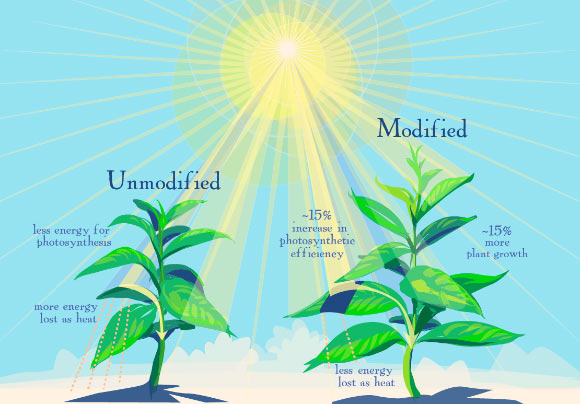Scientists from the University of Illinois have boosted crop yields in a revolutionary procedure that genetically enhances photosynthesis. The UN claims that in 2050, humanity will need to produce 70% more food than we do today. The researchers claim this new discovery will help bridge the gap towards feeding a growing population.

As computer models predicted, genetically modified plants are better able to make use of the limited sunlight available when their leaves go into the shade. Image credit: Julie McMahon.
The technique counteracts an unusual inefficiency in plant productivity. When sunlight is intense, plants activate a defense mechanism by turning excess energy into heat, called nonphotochemical quenching (NPQ).
However, once the light dims, this protective process can take up to half an hour to switch off, resulting in missed opportunities for photosynthesis. Essentially, the plant is wasting light as heat in times when light is most needed.
Using a form of genetic modification, scientists have addressed the problem by boosting three photosynthesis-related proteins.
The plants are then able to switch back to photosynthesis much faster than usual.
The experiment was conducted on a tobacco plant, Nicotiana tabacum, and of the three strains tested, two consistently increased biomass productivity by a staggering 20%, whilst the third by 14%.
It may appear strange that plants haven’t evolved to overcome this inefficiency themselves. This is because photosynthetic effectiveness is not the factor that limits plant growth in the wild, but rather nitrogen availability.
For many years, the scientific community has hosted an ongoing debate as to whether it’s possible to increase crop yields via genetically tampering with a plant’s photosynthesis.
These results, published in the journal Science, are the first proof-of-concept.
The Bill and Melinda Gates Foundation funded the pioneering research, and are transferring the technology to rice, cassava and soy beans.
“We don’t know for certain if this approach will work in other crops, but because we’re targeting a universal process that is the same in all crops, we’re pretty sure it will,” says Professor Stephen Long, lead author of the study.
Genetic modification entails a long line of activist backlash. Most EU nations have an official ban on farmers growing GM crops. Anti-GM activist campaigns largely revolve around the dangers of transferring genes from one species to another. However, this nascent technology ameliorates these concerns because it only enhances proteins already existing within the plant species.
Prof. Long argues, “My attitude is that it is very important to have these new technologies on the shelf now because it can take 20 years before such inventions can reach farmer’s fields.”
Each year, developed nations waste as much food as the entire net food production of sub-Saharan Africa (approx. 230 million tons).
Implementing an economic system that redistributes produce is seen by some as the Holy Grail of food security, but it’s likely to be a long way off.
Until then, new technologies that enhance yield without encroaching into the natural world will be essential.
_____
Johannes Kromdijk et al. 2016. Improving photosynthesis and crop productivity by accelerating recovery from photoprotection. Science 354 (6314): 857-861; doi: 10.1126/science.aai8878







